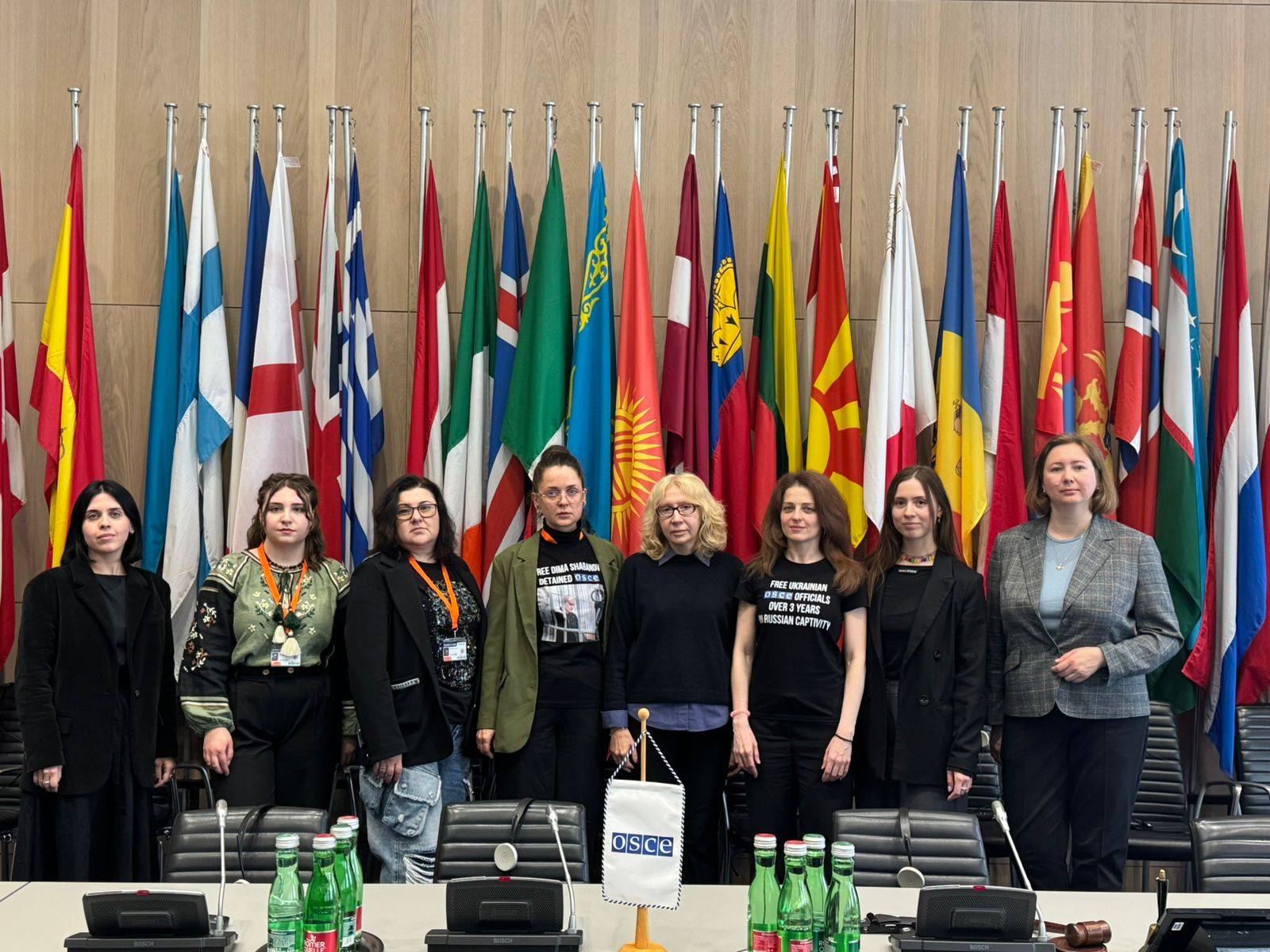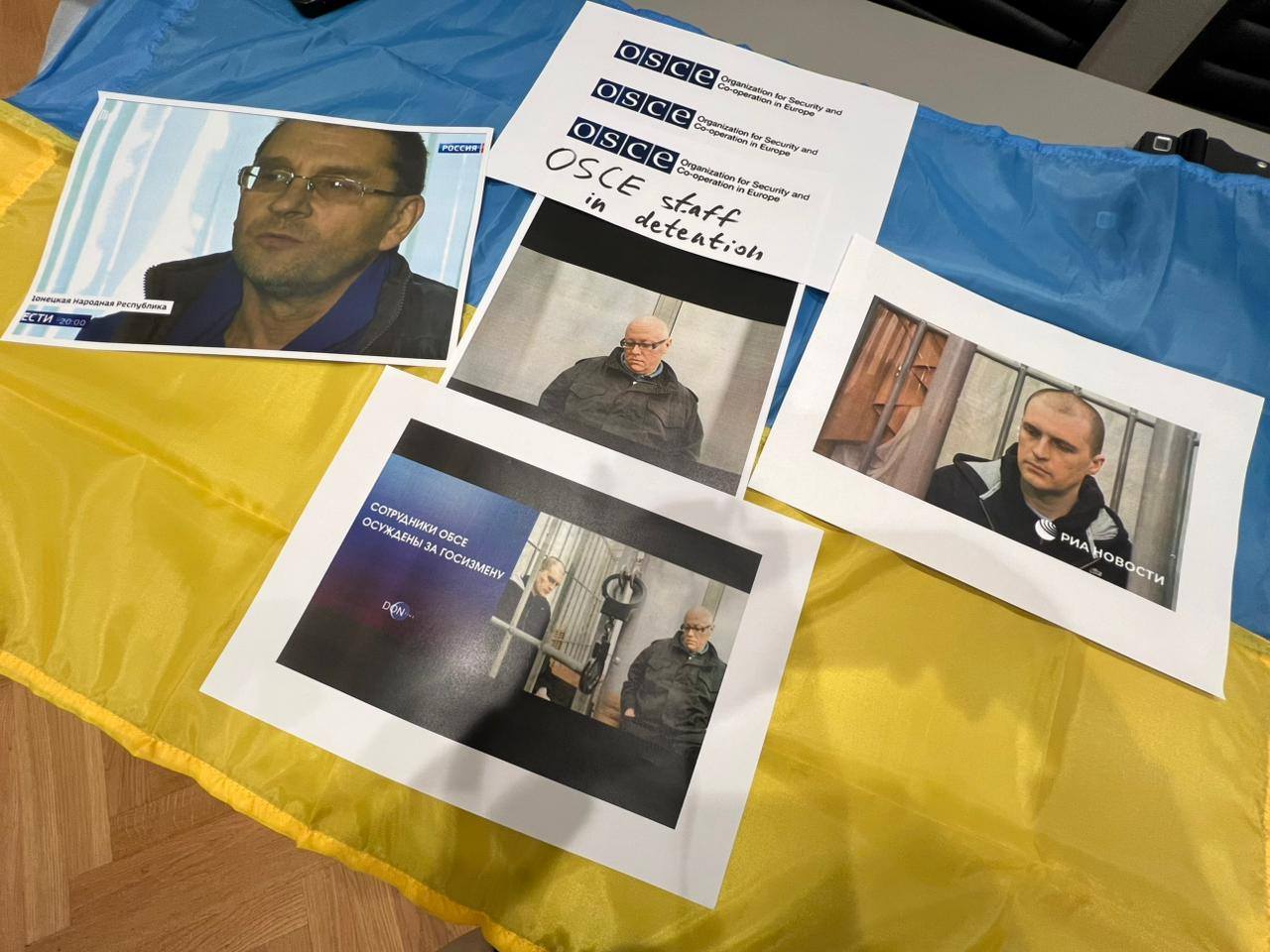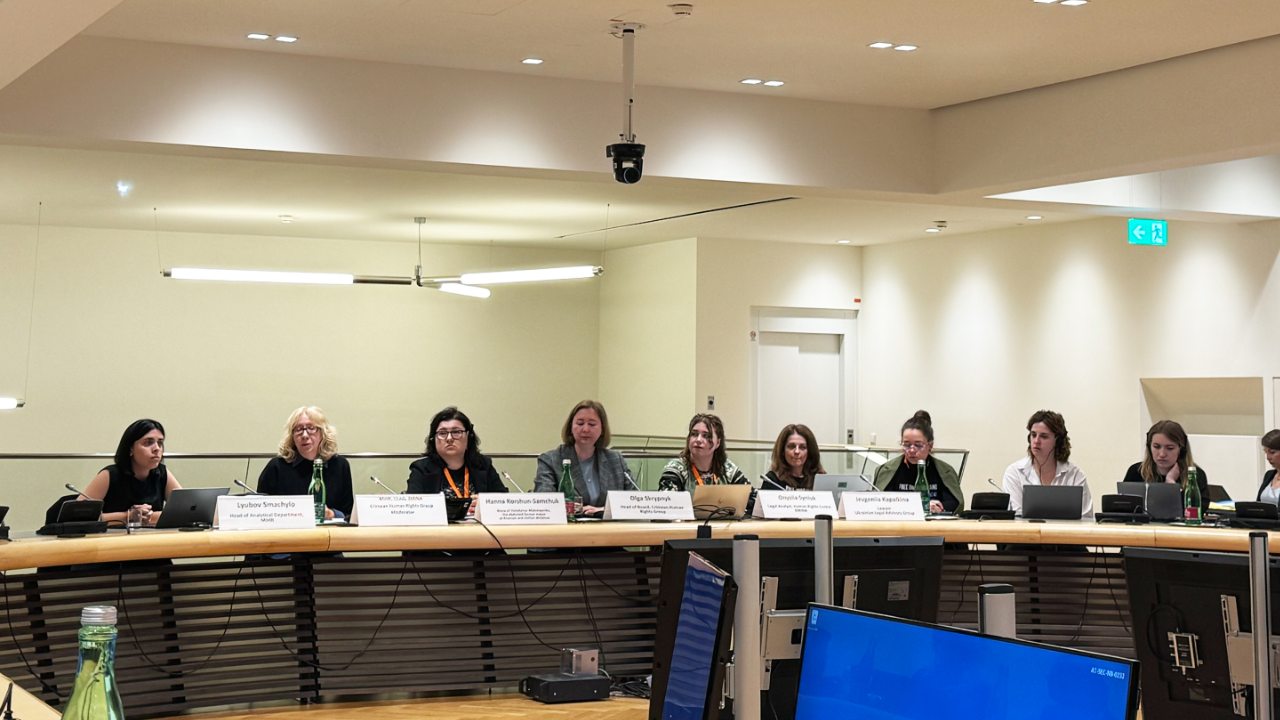Representatives of the authorities have become targets of the Russian Federation: ZMINA at the OSCE spoke about the persecution of active citizens in the occupation
On 7 May 2025, a special event was held in Vienna within the framework of the OSCE Supplementary Human Dimension Meeting on the persecution of civilians in the temporarily occupied territories of Ukraine. The event “Civil Society in Russian Captivity: Enforced Disappearances and Arbitrary Detentions by Russia as a Tool to Erase Civic Space in Occupied Territories of Ukraine” was organised by the Media Initiative for Human Rights (MIHR), Ukrainian Legal Advisory Group (ULAG), the Human Rights Centre ZMINA and the Crimean Human Rights Group with the support of the Permanent Mission of Ukraine to the International Organisations in Vienna. The event was attended by more than 35 representatives of OSCE Participating States, including Canada, Norway, Italy, the United Kingdom, Sweden and the United States.

The event focused on the systematic persecution of journalists, human rights defenders, local officials and OSCE staff by Russia in the TOT.
The moderator of the event was Deputy Permanent Mission of Ukraine to the International Organisations in Vienna, Viktoria Kuvshynnykova, who opened the event by highlighting Russia’s systematic persecution of journalists, human rights defenders and local leaders. She highlighted that the murder of journalist Victoria Roshchyna is a testament to the realities of the occupation regime and called on OSCE countries to take decisive action to bring Russia to justice.
Onysiia Syniuk, Legal Analyst of the Human Rights Centre ZMINA, stressed that since the beginning of the full-scale invasion, local authorities remained the only representatives of Ukrainian statehood. That is why the occupation administration aimed at using their authority in the communities, and in case of resistance, resorted to abductions, torture and isolation. She noted that representatives of local authorities who refused to cooperate with the occupiers became one of the main targets of Russian persecution: “They united communities around them and prevented the formation of a power vacuum. They embodied democratic governance, which Russia intended to destroy. That is why at the end of March 2022, the occupation forces began to persecute local officials“.

According to the human rights defender, the occupiers first tried to persuade the authorities to cooperate. If this did not work, they resorted to threats, violence and illegal detentions. They were held in inhumane conditions, tortured, and some died in detention. Some of them are still being illegally detained in Russia without any access to them.
“The persecution of local authorities is not just an attack on individuals. This is a deliberate campaign against democratic governance and part of a large-scale attack on the civilian population,” said Syniuk.
They called on the international community to continue to put pressure on Russia to comply with international humanitarian law and provide information about all illegally detained Ukrainians: “We call on international organisations to consider these crimes as part of the persecution of civilians — a crime against humanity. We must put pressure on Russia to disclose information about the detainees, improve their detention conditions, and ensure they can communicate with their families”.
Lyubov Smachylo, Head of the Analytical Department of the MIHR, said that since 2022, at least 1,925 civilians have been detained by Russian representatives: “The persecution of civilians in the occupied territories is a deliberate policy of Russia, which has signs of a crime against humanity. In 2022, Russia detained at least 1,925 civilians. However, due to the ongoing occupation and the absence of opportunities to obtain information from the Russian Federation, we cannot establish the exact number and assume that the total number is much higher, perhaps several times higher“.
She suggested a new tactic for releasing detainees — separating small groups of detainees according to different criteria (age, gender, health status, profession) for more effective advocacy and communication with international partners.

Ievgeniia Kapalkina, Lawyer of the Ukrainian Legal Advisory Group (ULAG), focused on Russia’s persecution of international organisations. She stressed that Russia’s unlawful conviction of three Ukrainian employees of the OSCE Special Monitoring Mission — Dmytro Shabanov, Maksym Petrov and Vadym Holda — on fabricated charges of “espionage” is a blatant example of disregard for international law. According to the human rights defender, by such actions, Russia is deliberately undermining the foundations of the international legal system, which is designed to protect the personnel of peacekeeping missions in conflict zones.
“These ‘verdicts’ are not just a blatant miscarriage of justice. This is a direct attack on the OSCE principles and the international legal system that guarantees the safety of civilian personnel in peacekeeping missions,” Kapalkina said.
According to Kapalkina, the case of the OSCE staff could lead to a dangerous precedent, as its mandate is not respected and its employees are being persecuted and tortured. In this case, the monitoring mission cannot be effective because of the threat of arrest of its representatives.
She also commented on the case of the journalist Victoria Roshchyna, who was tortured by Russians: “This case is not only about the tragic death of a journalist. It is about systemic violations of humanitarian law: delays in the transfer of bodies, manipulation of remains, absence of transparency and obstruction of justice,” said Kapalkina.
ZMINA’s participation in the event was part of the project “Combating Impunity for the Most Serious International Crimes in the Context of Russian Armed Aggression against Ukraine” with the support of the Embassy of the Swiss Confederation in Ukraine.
For reference: The OSCE Supplementary Human Dimension Meeting is a special forum organised several times a year by ODIHR (Office for Democratic Institutions and Human Rights) to discuss topical issues in the field of human rights, democracy, the rule of law and non-discrimination. The meetings are attended by representatives of OSCE participating States, international organisations and civil society. The goal is to share experiences, identify challenges and develop recommendations to improve compliance with commitments in the humanitarian dimension.
If you have found a spelling error, please, notify us by selecting that text and pressing Ctrl+Enter.















